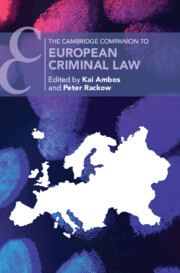72 results
Part V - Institutions
-
- Book:
- The Cambridge Companion to European Criminal Law
- Published online:
- 09 February 2023
- Print publication:
- 16 February 2023, pp 327-438
-
- Chapter
- Export citation
Part II - Purposes and Principles
-
- Book:
- The Cambridge Companion to European Criminal Law
- Published online:
- 09 February 2023
- Print publication:
- 16 February 2023, pp 57-154
-
- Chapter
- Export citation
Notes on Contributors
-
- Book:
- The Cambridge Companion to European Criminal Law
- Published online:
- 09 February 2023
- Print publication:
- 16 February 2023, pp x-xvi
-
- Chapter
- Export citation
Part I - Foundations of European Criminal Law
-
- Book:
- The Cambridge Companion to European Criminal Law
- Published online:
- 09 February 2023
- Print publication:
- 16 February 2023, pp 1-56
-
- Chapter
- Export citation
Preface
-
- Book:
- The Cambridge Companion to European Criminal Law
- Published online:
- 09 February 2023
- Print publication:
- 16 February 2023, pp xvii-xvii
-
- Chapter
- Export citation
Table of Cases
-
- Book:
- The Cambridge Companion to European Criminal Law
- Published online:
- 09 February 2023
- Print publication:
- 16 February 2023, pp xviii-xxvii
-
- Chapter
- Export citation
Part IV - European Criminal Procedure
-
- Book:
- The Cambridge Companion to European Criminal Law
- Published online:
- 09 February 2023
- Print publication:
- 16 February 2023, pp 229-326
-
- Chapter
- Export citation
Copyright page
-
- Book:
- The Cambridge Companion to European Criminal Law
- Published online:
- 09 February 2023
- Print publication:
- 16 February 2023, pp vi-vi
-
- Chapter
- Export citation
Contents
-
- Book:
- The Cambridge Companion to European Criminal Law
- Published online:
- 09 February 2023
- Print publication:
- 16 February 2023, pp vii-ix
-
- Chapter
- Export citation
Index
-
- Book:
- The Cambridge Companion to European Criminal Law
- Published online:
- 09 February 2023
- Print publication:
- 16 February 2023, pp 487-492
-
- Chapter
- Export citation
Bibliography
-
- Book:
- The Cambridge Companion to European Criminal Law
- Published online:
- 09 February 2023
- Print publication:
- 16 February 2023, pp 486-486
-
- Chapter
- Export citation
Part III - European Substantive Criminal Law
-
- Book:
- The Cambridge Companion to European Criminal Law
- Published online:
- 09 February 2023
- Print publication:
- 16 February 2023, pp 155-228
-
- Chapter
- Export citation
Part VI - Perspectives
-
- Book:
- The Cambridge Companion to European Criminal Law
- Published online:
- 09 February 2023
- Print publication:
- 16 February 2023, pp 439-485
-
- Chapter
- Export citation
Abbreviations
-
- Book:
- The Cambridge Companion to European Criminal Law
- Published online:
- 09 February 2023
- Print publication:
- 16 February 2023, pp xxviii-xxxiv
-
- Chapter
- Export citation
13 - Police (Operational and Other) Cooperation
- from Part IV - European Criminal Procedure
-
-
- Book:
- The Cambridge Companion to European Criminal Law
- Published online:
- 09 February 2023
- Print publication:
- 16 February 2023, pp 306-326
-
- Chapter
- Export citation

The Cambridge Companion to European Criminal Law
-
- Published online:
- 09 February 2023
- Print publication:
- 16 February 2023
Part III - Criminal Justice
-
- Book:
- Core Concepts in Criminal Law and Criminal Justice
- Published online:
- 24 February 2022
- Print publication:
- 17 February 2022, pp 347-437
-
- Chapter
- Export citation
About the Authors
-
- Book:
- Core Concepts in Criminal Law and Criminal Justice
- Published online:
- 24 February 2022
- Print publication:
- 17 February 2022, pp vii-xii
-
- Chapter
- Export citation
1 - Introduction to Volume II
-
-
- Book:
- Core Concepts in Criminal Law and Criminal Justice
- Published online:
- 24 February 2022
- Print publication:
- 17 February 2022, pp 1-10
-
- Chapter
- Export citation
Index
-
- Book:
- Core Concepts in Criminal Law and Criminal Justice
- Published online:
- 24 February 2022
- Print publication:
- 17 February 2022, pp 438-456
-
- Chapter
- Export citation

